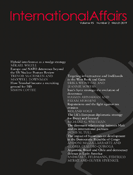The development of the two norms and their interrelationship, however, continue to be shaped by failure: failure to consider situations as requiring concerted international action; failure to respond in a timely and decisive fashion to protection crises; and failure to fully implement what mandates prescribe, write EMILY PADDON RHOADS and JENNIFER WELSH.
“While some of these failures represent deficiencies in capacity and political will, some have also been shaped by behavioural contestation of the two norms, as states ‘act out’ their dissent by blocking or hampering efforts to protect populations,” they contend in ‘Close cousins in protection: the evolution of two norms’, published in the May 2019 issue of International Affairs.
On the PoC side, the authors state, some might argue that this failure can actually be productive, given the norm’s more operational focus. The United Nations’ willingness to be transparent and frank about what has gone wrong in past peace operations also presents opportunities for the organization to bring member states together in efforts to improve doctrine and practice.
With respect to R2P, the impact of failure works in different and more complex ways. At the micro level, efforts to build state capacity to protect and to address risk factors leading to atrocity crimes are a powerful, if less visible, testament to the commitment to learn from past failures, the authors state.
But at the macro level, inaction in the face of war crimes, genocide and crimes against humanity—a quarter of a century after their perpetration in Rwanda and Srebrenica—raises doubts among some about the utility of a political principle, despite its unanimous endorsement in 2005, particularly in an international environment where unity among the major powers continues to prove so elusive.
Emily Paddon Rhoads, Jennifer Welsh, 'Close cousins in protection: the evolution of two norms', International Affairs, iiz054, https://doi.org/10.1093/ia/iiz054





No comments:
Post a Comment